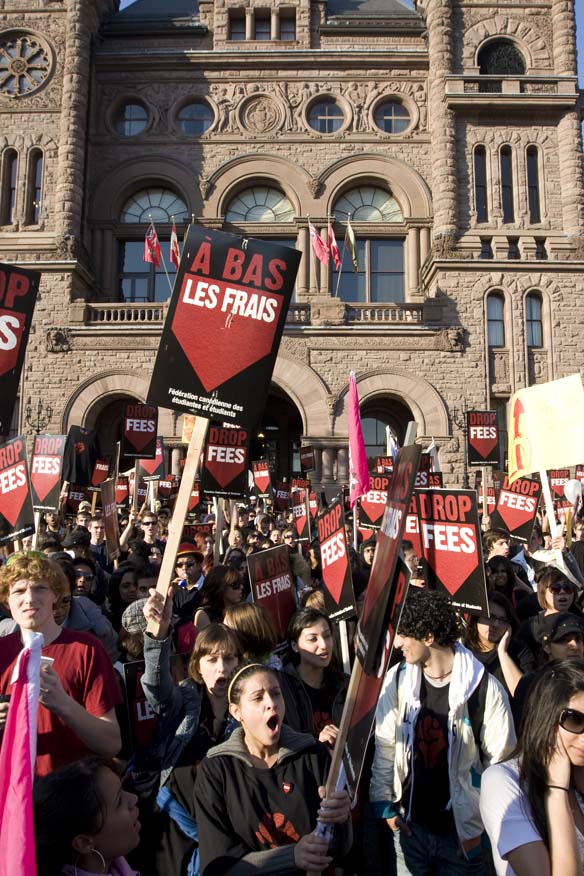Ontario announced a new tuition fee framework today. It’s the first time that the Liberal government has changed it in seven years.
In 2006, Dalton McGuinty punched students in the face with a five per cent, on average, fee increase. It was supposed to last four years, but was extended, painfully, until 2012.
During the 2011 Ontario election, the Liberals introduced a grant to help offset the burden of these fees for some students. To those of us who spent days analyzing the Liberal proposal and strategy, it was clear that they had hoped to divert some of the negative attention on their tuition policy by offering a confusing, runner-up prize.
In the same vein, the kinder, gentler Liberal party, now lead by a grandmother rather than a seemingly ageless dad, is trying to help students out.
Today, they announced that the fee increases: 5 per cent for most programs, 8 per cent for the programs where university administrators want to screw students the hardest, has been replaced with 3 per cent and 5 per cent respectively.
McGuinty’s (and now Wynne’s) fee increases were historic: they pushed Ontario’s fees to be the most expensive and they allowed for different fees to be charged to different programs. Today’s increase puts tuition on track to double under the Liberal reign alone.
Now, students sitting in a second-year elective are paying a combination of a bunch of different fees for the same class. I say “a bunch” because I stopped counting at 10 different combinations, depending on the year they started, the actual year of the class, their program of study or their citizenship. Yes, added bureaucracy is necessary to keep track of these divisions. Yes, students will pay more and receive the same instruction as other students.
This was a clever idea: charge incoming students the most (because high school students don’t protest), charge engineering students the most (because they’re way too busy to protest), charge graduate students the most (because they’re too busy rocking back and forth under their desks to protest) and charge international students the most (because Jason Kenney will deport them if they protest).
For some, it has meant an increase of more than 71 per cent.
High tuition fees are the best example of the insanity of austerity. Despite the fact that people who are better educated will earn more and pay more taxes (thereby paying for the cost of their education), Kathleen Wynne and her Neoliberal crew don’t care about the facts. They care about privatization. They care about eliminating the public system by stealth so that they don’t have to pay for it.
Indeed, Liberal, Tory… you know the rest.
Some “student groups” call it a step in the right direction. Of course, it isn’t. It’s a smaller step in the same direction. And, when walking towards a cliff, any steps in the direction of the cliff will lead to the same result. Wynne has smaller legs than McGuinty, this is just a difference in stride.
Actual students know that any tuition fee increase is simply going to exacerbate an already crisis situation. The Liberals hope that the pressures that are created by high tuition fees will be enough to continue to keep Ontario students quiet. And, it may. The crushing combination of high fees, high rents, youth unemployment and needing to, you know, live, depoliticizes and disenfranchises.
But, there is a breaking point. The question will just be how it manifests among Ontarians.
Today’s announcement does not come in a vacuum. The sustained political pressure that students have placed on the Liberals has helped to “win” this policy. The highly unpopular 30 per cent off grant exposed a floundering, rudderless Liberal party that realized that they were losing the war over the message. Ontario students should take some comfort in that.
But the other political context, the waves made by the student protests last year in Québec must also be considered. The impact their protests had on Ontarians, to teach that another system is possible, cannot be understated. The Maple Spring created spaces in Ontario where student activists could actually talk about free tuition fees and be taken seriously by their peers.
That’s the power of a peoples’ movement: raising consciousness and building capacity. Ontario was lucky to benefit from some side effects. Québec students will be reaping the harvest of their work for years to come, and the story isn’t anywhere near finished yet.
But the 3 per cent fee increase is a necessary reminder: Wynne, bowing to pressure and trying to distance herself publicly from McGuinty settled on a tuition fee increase lower than the past seven years. In Québec, Pauline Marois picked the same percentage to increase students’ fees, despite the fact that she rolled in on a wave that was absolutely opposing a hike. What’s the lesson here?
The line between demands made by social movements and minor policy changes is sometimes direct, sometimes crooked and most times non-existent. Marois tricked Québecers into voting PQ and turned around and went all Charest on them. Wynne was elected as the moderately progressive alternative and has turned around and gone all McGuinty on Ontarians.
Meanwhile, students in both provinces will be paying 3 per cent more next fall.
Political ideology is the domain of the Conservatives. Today, the remaining Neoliberal parties are populist, gauging where public interest is and governing accordingly. Under these conditions neither Ontarians nor Québecers have any chance of witnessing fundamental change. Austerity and populism has too great a control over the brains of our politicians. Instead, we’ll have to force it.
What the student movement in Québec does is reminds us that these battles, if fought and won in the streets, will be won by the people. The campaign will last longer than a semester. It’s origins will be theorizable but it’s effects can only be told in retrospect. Its existence gives hope and a path to follow.
So Ontarians, how will you play your hand?



